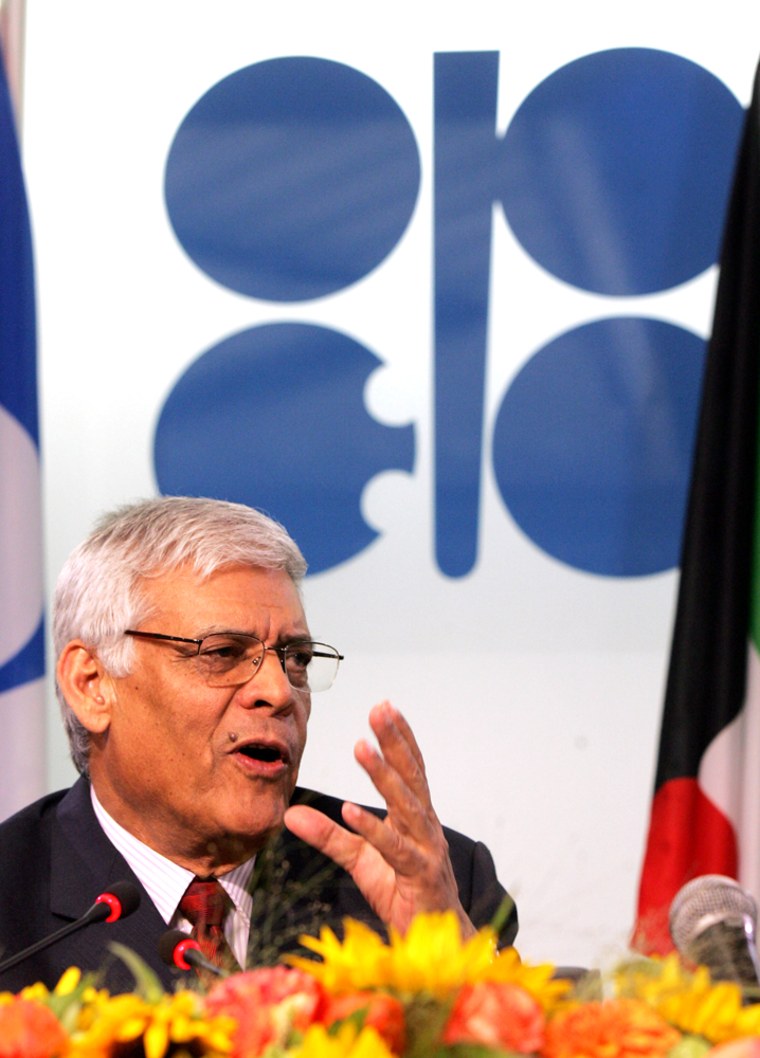OPEC sought to reassure jittery oil markets Tuesday by agreeing to boost crude production by 500,000 barrels a day — a move the cartel conceded was prompted partly by “clouds on the horizon” from the U.S. housing slump.
The Organization of Petroleum Exporting Countries said the higher output would begin Nov. 1. It pledged to “vigilantly monitor” the other factors buffeting crude markets, including worries that supplies might not keep pace with higher demand later this year as it becomes winter in the Northern Hemisphere.
Significantly — and surprisingly — the 12-nation cartel said the increase would be based on current production, meaning it will add real oil to the market.
In the recent past, OPEC has raised only its official output quota — and because it tends to pump over those targets, the increases were purely cosmetic.
“Our message to the consumer is that we care,” said Abdalla Salem El-Badri, OPEC’s secretary general.
“We are concerned, and that is why we increased production,” he said.
After OPEC’s announcement, light, sweet crude for October delivery immediately advanced above $78 a barrel on the New York Mercantile Exchange. By the end of an up and down session, it rose 74 cents to settle at $78.23 a barrel, besting the previous record, set July 31, by 2 cents.
In London, October Brent crude gained 23 cents to $75.71 a barrel on the ICE Futures exchange.
“The fact that they’re actually adding oil is very, very positive,” said John Hall, an analyst with John Hall Associates in London.
Hall noted that prices have more than doubled in just 2½ years. Crude hit an intraday record of $78.77 a barrel in early August on the Nymex, and prices since have been holding fairly steadily above $76.
But Simon Wardell, a senior energy consultant with Global Insight, said high crude costs may be here to stay.
“While OPEC’s move will have a short-term price effect, the medium-term picture appears to be set for continued high prices,” he said.
El-Badri told reporters the decision to loosen OPEC’s taps was based in part on the effects of the crisis in the U.S. subprime mortgage market, where defaults have prompted lenders to tighten loan requirements.
That has sent ripples across all sectors of the economy, including the energy market, by raising fears of a U.S. recession and reduced demand for oil and gasoline.
“We have seen the financial markets and the subprime mortgage (crisis) putting some clouds on the horizon,” he said.
Before the meeting, key members had said they were satisfied that crude supplies were ample.
But Gulf states led by Saudi Arabia, OPEC’s top producer and most influential member, pressed for action that would reassure markets that the cartel can meet expectations of a spike in demand this winter.
OPEC supplies about 40 percent of the global demand for crude.
The cartel’s new output target is 27.2 million barrels a day, El-Badri said. That effectively acknowledges the estimated 900,000 barrels OPEC already was pumping over its former target of 25.8 million barrels a day.
The group has a spare capacity of up to 3.15 million barrels a day, said Eshan Ul-Haq, chief analyst for Vienna’s PVM Oil Associates.
OPEC President Mohamed Al Hamli, who doubles as energy minister for the United Arab Emirates, said the cartel was mindful of what he described as “continuing uncertainties about the world oil demand outlook, exacerbated recently by financial markets turmoil.”
“OPEC will continue monitoring oil market developments and will act in a timely and adequate manner, should there be indications of a shortage of crude,” Al Hamli said. OPEC’s next meeting is Dec. 5 in Abu Dhabi.
The Paris-based International Energy Agency repeatedly had urged the group to raise crude output, arguing that global demand is likely to outstrip supply with the advent of winter.
OPEC said in a statement that it saw a “comfortable buildup in inventory levels, especially of crude,” but it also noted that “ongoing tightness in the U.S. products market continues to affect the level of product stocks and prices.”
“We’re in a different market than we were in a few months ago,” conceded Algeria’s energy minister, Chakib Khelil.
But other OPEC members had said they felt no compulsion to act quickly, since demand for gasoline and diesel fuel has slackened with the end of the summer driving season.
Iran’s acting oil minister, Gholam Hossein Nozari, said the cartel shouldn’t be held responsible for the world’s economic woes.
“The economic situation does not depend only on OPEC,” he said.
The 12 OPEC members are Algeria, Angola, Indonesia, Iran, Iraq, Kuwait, Libya, Nigeria, Qatar, Saudi Arabia, United Arab Emirates and Venezuela.
Two members — Angola and Iraq — are not bound by the cartel’s official output quotas.
